Wice Surname Ancestry ResultsOur indexes 1000-1999 include entries for the spelling 'wice'. In the period you have requested, we have the following 15 records (displaying 1 to 10): Buy all | | | Get all 15 records to view, to save and print for £82.00 |
These sample scans are from the original record. You will get scans of the full pages or articles where the surname you searched for has been found. Your web browser may prevent the sample windows from opening; in this case please change your browser settings to allow pop-up windows from this site. Grantees of offices, commissions and pardons
(1272-1281)
The Patent Rolls are the Chancery enrolments of royal letters patent. Those for the 1st to the 9th years of the reign of king Edward I (29 November 1272 to 17 November 1281) were edited for the Public Record Office by J. G. Black, and published in 1901. The main contents are royal commissions and grants; ratifications of ecclesiastical estates; writs of aid to royal servants and purveyors; and pardons. WICE. Cost: £2.00.  | Sample scan, click to enlarge

|  Apprentices registered in Scotland
(1741-1745) Apprentices registered in Scotland
(1741-1745)
Apprenticeship indentures and clerks' articles were subject to a 6d or 12d per pound stamp duty: the registers of the payments usually give the master's trade, address, and occupation, and the apprentice's father's name and address, as well as details of the date and length of the apprenticeship. There are central registers for collections of the stamp duty in London, as well as returns from collectors in the provinces and from Scotland. The sums collected are recorded in Scottish money, with conversion to sterling for transfer to London. A Scottish pund was worth 20 English pence. (The sample entry shown on this scan is taken from a Norfolk return)WICE. Cost: £8.00.  | Sample scan, click to enlarge

| Deaths, Marriages, Bankrupts, Dividends and Patents
(1825-1826)
Death notices and obituaries, marriage and birth notices, bankrupts and dividends, and patents, as reported in the Monthly Magazine or British Register. Includes some marriages and deaths from Ireland, Scotland and abroad.
WICE. Cost: £6.00.  | Sample scan, click to enlarge

| Electors for Wakefield
(1848)
On 14 and 15 December 1848 an election took place for a Knight of the Shire for the West Riding of Yorkshire in the House of Commons. The candidates were Edmund Denison and sir Culling Eardley Eardley, gaining 14,743 and 11,795 votes respectively. The county franchise at this period included freeholders of land worth 40s or more a year; £10 copyholders and long-leaseholders; and £50 short-leaseholders and tenants. This poll book was published in 1849.
Former poll books had been compiled from the sheriff's returns; but as these were now transmitted to the Home Office immediately after an election, in this instance the polling was marked from the check-clerk's returns, carefully compared with the registers marked in the poll booths at the time of voting.
The votes for the respective candidates are indicated by the numerals 1 (Denison) and 2 (Eardley). The omission of these numerals indicates that the elector did not vote. Many names which appear on the register of particular townships are completely omitted in this poll book: in all these cases, the same name will be found recorded in some other township, the elector having two or more qualifications. In such cases, his name only appears in the poll book in the actual township for which he chose to vote; or, if he did not vote at all, in that township for which he was qualified that lay closest to his actual residence.
The townships are arranged alphabetically within polling district; and within each township the names are arranged alphabetically by surname and christian name, and the elector's residence is given. Many of the electors resided outside the township for which they were qualified - some in other counties. Moreover, at the end of each polling district there is a list of persons registered to poll in that district, from townships is other districts. WICE. Cost: £6.00.  | Sample scan, click to enlarge
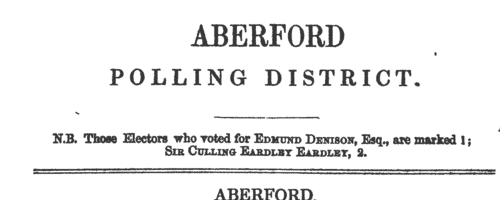
| Inhabitants of Wakefield, Yorkshire
(1853)
William White's directory lists traders, farmers and private residents in the area.WICE. Cost: £6.00.  | Sample scan, click to enlarge
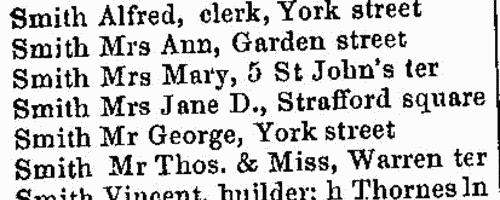
| Pharmaceutical Society of Great Britain: Country Members
(1856)
The membership list of the Pharmaceutical Society was divided into London Members; Country Members; Foreign Life Members; Associates admitted before 1 July 1842; Associates who have passed the Major Examination; and Associates who have passed the Minor Examination. In each case the lists give year of admission; number of certificate (where appropriate); name (surname first, christian name and initials); and address (house number and street name in London, merely town of residence elsewhere). An asterisk before the surname indicates a life member (except in the list of Foreign Life Members). There is also a list of registered apprentices: in this list we have year of registration, full name (surname first); master's name (in the form 'residing with Mr. Smith') and town.WICE. Cost: £4.00.  | Sample scan, click to enlarge

| Country Members of the Pharmaceutical Society
(1865)
The annual list of Members, Associates and Apprentices of the Pharmaceutical Society of Great Britain includes lists of London Members and Country Members (giving year of membership, number of certificate (if any), full name (surname first), and address: an asterisk indicates a Life Member); Associates admitted before 1 July 1842 (with full name, and where registered); Associates of the Society who had passed the Major Examination and were registered as Pharmaceutical Chemists, and Associates of the Society who had passed the Minor Examination and were registered as Assistants (year of admission, number of certificate, full name, and where registered); and Registered Apprentices (with date of registration, full name, residing with, and town).
WICE. Cost: £4.00.  | Sample scan, click to enlarge

| Pupil Teachers training to become Schoolmistresses
(1875)
The Education Department set examinations for candidates for admission into training colleges, and to become teachers. This is the class list (in order of merit) of the women who took that examination at Christmas 1875, and who were awarded Second Class results. The first column gives the position in the exam results (no number is inserted where the candidate obtained the same marks as the last to whose name a number is prefixed); then there is the candidate's name (surname first); school in which engaged (N. for National School, Ch. Church of England, B. British School, W. Wesleyan, R. Roman Catholic, P. Parochial, Bd. Board School, U. Poor Law Union School); and then Training College at which examined. (The sample scan is from a general class list for schoolmistresses)WICE. Cost: £6.00.  | Sample scan, click to enlarge
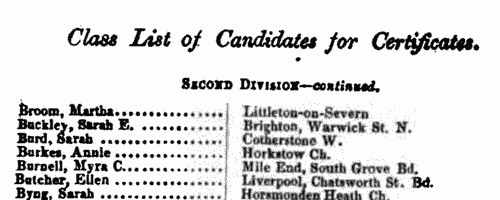
| Trainee Schoolmasters in England and Wales
(1876)
The Education Department set examinations for candidates for admission into training colleges, and for the office of teacher. This is the list of successful male candidates from England and Wales at the examination in July 1876. The number in the first column shows order of merit in each class in the examination; then there is the name of the candidate (surname, christian name and any intermediate initial(s)), the school in which engaged, and the training college at which examined. The names of pupil teachers are shown in italics, with the 'school in which engaged' column left blank. These abbreviations are used in the names of schools: B., British; Bd., Board; Ch., Church of England; N., National; P., Parochial; R. C., Roman Catholic; U., Poor Law Union; W., Wesleyan Methodist.WICE. Cost: £6.00.  | Sample scan, click to enlarge
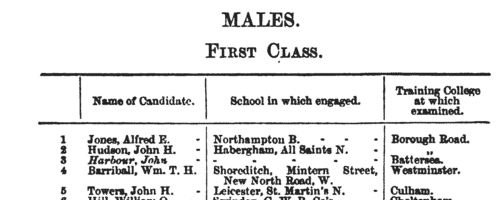
| Trainee Schoolmasters in England and Wales
(1877)
The Education Department set examinations for candidates for admission into training colleges, and for the office of teacher. This is the list of successful male candidates from England and Wales at the examination at Midsummer 1877. The number in the first column shows order of merit in each class in the examination; then there is the name of the candidate (surname, christian name and any intermediate initial(s)), the school in which engaged, and the training college at which examined. The names of pupil teachers are shown in italics, with the 'school in which engaged' column left blank. These abbreviations are used in the names of schools: B., British; Bd., Board; Ch., Church of England; N., National; P., Parochial; R. C., Roman Catholic; U., Poor Law Union; W., Wesleyan Methodist.WICE. Cost: £6.00.  | Sample scan, click to enlarge
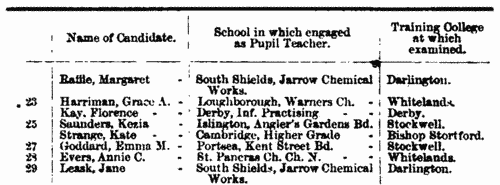
|
| 1 | 2 |  |
Research your ancestry, family history, genealogy and one-name study by direct access to original records and archives indexed by surname.
|













